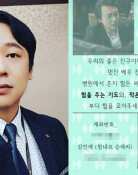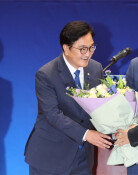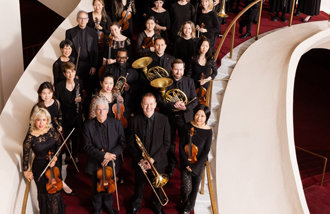[Editorial] Constitutional Amendment
In a speech to celebrate Constitution Day yesterday, National Assembly Speaker Kim Hyung-o proposed a special parliamentary committee and discussing constitutional amendment at a regular parliamentary session before the end of this year. The 18th National Assembly has passed the first half of its term. Now is the time to amend the Constitution. I hope the bill for constitutional amendment will be drawn up, passed by the National Assembly, and put to a referendum before the local elections in June next year. The Constitution has limitations since it has failed to respond to the rapidly changing environment, Speaker Kim said. The new Constitution should be more advanced, decentralize power, and unite the people, he added.
Kim did not mention details, but is said to be considering a sweeping amendment covering a dual presidential-parliamentary government system and a two-term, four-year presidency. His idea also includes a measure to hold the presidential and general elections in the same year. He has studied the Constitution for the past year after forming an advisory committee for constitutional study. In addition, 186 ruling and opposition party representatives formed the Future Korea Constitution Committee to push constitutional amendment.
The Constitution was last amended in 1987 and remained untouched for a record 22 years, making peaceful regime change in Korea possible. Certainly, however, it does have problems. Many politicians, scholars and the general public agree that revision is needed. Given that, the National Assembly, which is in charge of enacting and revising laws, should take the initiative in the discussion on constitutional revision and be responsible for constitutional revision.
Opponents have questioned whether this is the right time to push through constitutional amendment, however. The Constitution is a rigid body of laws amendable only through agreement by the National Assembly and the general public. As the history of the Constitution shows, most amendments were pursued by presidents, who have the power to do so. Nevertheless, opposition parties say Kim suggested an amendment out of political motivation. The presidential office of Cheong Wa Dae and the ruling Grand National Party have also been lukewarm to constitutional revision. Heo Yeong, chief director of the Constitutional Trial Research Center, said, The government should emphasize economic recovery. If it begins discussing constitutional amendment, countless interest groups and political parties will struggle to change the Constitution in a way benefiting them. The government should amend the Constitution after unification, he added. Moreover, the government has little time to discuss amendment in a regular parliamentary session and revise the Constitution before next years local elections.
Also, political parties may have conflicts of interest over the form of government. Some have long argued that the government should maintain the single five-year presidential term, prevent the chief executive from holding too much power, and enable the National Assembly to strengthen its ability to hold the president in check. Others say, however, that the single presidential term inevitably creates the lame duck phenomenon early on and deprives a president the chance to be evaluated by the general public. The National Assembly has malfunctioned since the ruling and opposition parties are at odds. If parties seriously collide over constitutional revision, it will further weaken parliaments capability to rule and aggravate political standoffs.
The National Assembly needs to discuss constitutional change, but should not stipulate that it will pass a constitutional amendment before next years local elections and struggle to meet the deadline. This goal is also realistically unachievable. Instead, parliament should encourage representatives to hold constructive discussion and research while seeking a broader national consensus.







